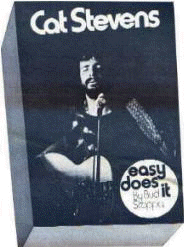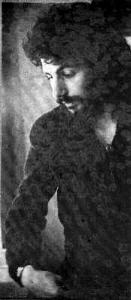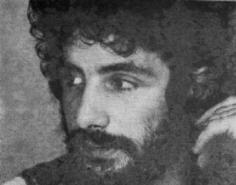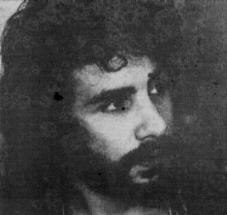- Rock Magazine
- May 24, 1971
- Courtesy of Linda Crafar.

Easy Does It
By Bud Scoppa
Stephen Giorgio and Alun
Davies sat in straight-backed chairs facing 2300 non believers. From the Fillmore
East balcony, Cat Stevens and partner looked hopelessly tiny. Just two seated figures
holding guitars; no banks of amps, no massed drums, no sparkle suits.
From the audience came a
continuous buzz, as if each member was surprised by the puniness of the foe. Still, the
crowd would have to amuse itself by toying with these already overwhelmed figures -
perhaps even shame them off the stage.
‘‘Hello.’’
What was that? The
dark-haired one had greeted the crowd as if he didn’t realize the danger. He began to
play his funny little songs while the audience talked over him. But he didn’t appear
to be bothered by the crowd’s lack of commitment — in fact, he seemed to hardly
notice.
For the people who were
waiting ever so patiently for Traffic to appear, this little upstart had a very annoying
habit: he spoke between songs as if he were in someone’s apartment for the first time
— polite, friendly, warm. This kind of intimacy was practically unheard of at the
Fillmore, with its reputation for toughness. The kid must be awfully naive. . .
 Forty
minutes later, this unknown who called himself Cat Stevens had the audience on its feet,
not in derision but in happy surprise. No one there that night had ever heard of
"Wild World," or "Hard-Headed Woman," or "Father and Son."
They’d had nothing to go on except this kid’s straightforward charm.
Along the way, the crowds had also learned that Cat Stevens could write songs — and
sing them, too — like nobody else. The word spread — gradually, it’s true,
but steadily — about this innocent who had shown up Traffic on its home ground. Forty
minutes later, this unknown who called himself Cat Stevens had the audience on its feet,
not in derision but in happy surprise. No one there that night had ever heard of
"Wild World," or "Hard-Headed Woman," or "Father and Son."
They’d had nothing to go on except this kid’s straightforward charm.
Along the way, the crowds had also learned that Cat Stevens could write songs — and
sing them, too — like nobody else. The word spread — gradually, it’s true,
but steadily — about this innocent who had shown up Traffic on its home ground.
The next week, Steven
Giorgio’s appearance at the tiny Gaslight attracted some of the same people
who’d been soothed into submission at the Fillmore. At closer quarters, it was
immediately evident that the kid had a singular and irresistable charm to match his
talent. In his naivete, he ribboned his songs with unembarrassed, "oohs" and
"la-la-la's," and he seemed to enjoy mouthing the syllables. And be used
his voice as a little boy would greet his dog. He eagerly bounced from the top to the
bottom of its range and back again, glorying in the texture and the feel of it. The
unallayed joy he gave himself through his own performance was quickly and evenly
distributed among the people who listened.
On top of everything else,
Cat Stevens showed himself at close range to be the owner of a finely structured,
beautifully open face. A slightly uneven nose kept the face from becoming too proud of
itself — kept it from any tendency to take a condescending attitude. The gold of
Greek ancestors had been willed to him and he wore it proudly on his skin. His natural
Adriatic intensity was balanced by an easy, gentle spirit.Upon seeing him up close, we had
an inkling that it was just a matter of time. We were right.
The next morning, AIun
Davies confessed he was worried that people would think he and Steve sounded too much like
Simon and Garfunkel (a notion that I'm sure had occurred to no one who’d seen them).
Paul Simon’s mid-60’s stay in England, and the solo album that resulted from the
stay, had indeed been an inspiration to Steve and to many other aspiring English folkies
and songwriters. The Paul Simon Songbook (never released in the US) is still among
Steve’s favorite albums. The Simon influence is there, in fully assimilated
form, but only in some of the melodies. Cat’s songs are much brighter and freer than
Simon’s. Steve’s not haunted by the same ghosts. He’s already exorcised
them.
A long bout with
tuberculosis put an end to the barely begun career of adolescent Cat Stevens. Before he
fell ill, Steve had completed two albums for Deram. Both were filled with clever little
songs but burdened with insensitive and heavy-handed arrangements. Another shortcoming: At
the time, Steve had no idea what his voice could do. He failed, as a singer, to really
take command of his songs — to seize each song by the hair and ram it across, as he
does so well now.
His recuperative period was
also a time of continuous self-analysis. Steve's bad fortune had its benefits:
It’s not often that an individual has the opportunity to take stock of himself just
as he's about to embark on his chosen vocation. Young men are too busy doing to
reflect — that is, if they can sense success within their reach. The knack of
reflection is normally acquired only after this prolonged exertion of youth.
Cat Stevens might have
become another mediocre middle-of-the-road pop singer if TB hadn’t stopped him; the
photo on the cover of his New Masters LP, on Deram, makes him out to be an eager
young Anthony Newley. From "Matthew and Son" to "Why Can’t I Fall In
Love" isn't really so great a distance. But good fortune prevailed, discussed as
tragedy.
It was apparent to me the
morning I met him that this guy was really happy. We see genuinely happy
people so rarely these days that the real thing stands out. He was still a nobody at that
point last autumn, but that didn’t matter. Steve was flushed with the certainty that
he was doing exactly what he wanted to do. It was a bonus that people seemed to like what
he did.
During his convalescence,
Steve had begun writing songs again. These songs were different than those he’d
written before his illness — they had a cathartic effect on him. He faced his old
adversaries — fear of rejection, self-doubts — in his new songs, and he found he
could beat them. With his new confidence came his new voice — rangy and virile, but
capable of an equally dramatic gentleness — and the rest fell into place.
Mona Bone Jakon, the
name of Steve’s initial effort in his "second" career, is said to refer to
one’s inability to get an erection:
"I’d already done
that drawing of the garbage can with the drop coming out of the top. When I thought of it
in relation to the album title, it sort of made sense, so I made it the album cover."
When he talks about his
life, feelings of inadequacy pop up in his words:
"The first song l ever
wrote was called something like ‘Darling Mary,’ or 'Darling Nell.’
What inspired you?
"I think it was
bein’ rejected from her door — Oh, no it wasn’t." he laughed, all but
triumphantly. "It was terrible. It was my friend, you see, and I used to go to see my
friend. He had a very big family and lots of sisters. I used to go there mainly to see my
friend and then suddenly I became aware of one of his sisters. So while he was downstairs,
I’d be upstairs with his sister, and he never got on to it; he never found out
anything about. it. So it was that kind of scene and I was struggling to
express it. I was very weird then."
After spending those months
on the road to find out, Cat seems to have resolved those kinds of conflicts. The biggest
question facing him that morning last autumn concerned the release of a Cat Stevens
single: Should he let them do it? If so, what?
" I think it’s a
good idea not to release a single just yet: Maybe they’ll want one from the LP in
about two months’ time ...... for when I come over next."
 It
turned out that Steve had an impeccable sense of timing. At the time, everybody was
too busy with Elton John and James Taylor to pay another new one any
attention (at the time, I couldn’t even talk my good friend the editor into letting
me review Tea For The Tillerman, Cat’s then brand new album). Two months
later, as the populace wearied of all that hyper-aggressive promotion, what should quietly
float into the choked atmosphere but ".. . ooh, baby, baby, it’s a wild world,
and it’s hard to get by just upon a smile," words and melody so beautifully
unprepossessing that hardly anyone could resist it. It
turned out that Steve had an impeccable sense of timing. At the time, everybody was
too busy with Elton John and James Taylor to pay another new one any
attention (at the time, I couldn’t even talk my good friend the editor into letting
me review Tea For The Tillerman, Cat’s then brand new album). Two months
later, as the populace wearied of all that hyper-aggressive promotion, what should quietly
float into the choked atmosphere but ".. . ooh, baby, baby, it’s a wild world,
and it’s hard to get by just upon a smile," words and melody so beautifully
unprepossessing that hardly anyone could resist it.
"Wild World" gave
Tea for the Tillerman enough kick to get it played on FM radio and the exquisite
album that Island Records boss Chris Blackwell had unequivocably called "the best
album we’ve ever released" (and that meant he felt it was better than Mr
Fantasy, among others) began to enchant listeners on a mass scale.
That was the icing on
Steve’s cake. The second time around, he played to packed-full houses, to audiences
that were as excited before he came on as they’d been after the encore during his
first tour. But that didn’t change anything basic. On stage, he was still
refreshingly innocent and direct. Oh, he was delighted by the warm response, but then
he’d been equally delighted at winning over initially hostile audiences a few months
before. (at the end of that now-legendary Fillmore set, he stood and bowed to the waist,
then embraced Alun warmly—that lovely show of humility had gotten to even the diehard
cynics who’d resisted his charm and skill up to that point).
And little things still
delight him as well:
"It’s kind of
funny when somebody suddenly says, 'Wow you sound like an old guy!’ " he laughs.
"I can’t imagine my voice as being quite like — well, I did imagine it
being quite medium range, you know. A normal voice, but a bit harder. But to some people
it sounds very old."
A small thing, but
revealing, nonetheless: he listens to people — that’s his nature — and now,
because of his rapid commercial success, he's getting a volley of feedback. That worries
him a bit:
The thing that went wrong
with the Beatles is they actually started writing for the people who were reading into
their songs. At first, they let it happen from inspiration, and perhaps they wrote
something that they didn’t know what it meant. And then finally they started
reading about what it all actually meant, and then they became more obvious."
When you set out to write
something, do you have a story you want to tell? I mean, do you have something very
specific or does it come from words that you just kind of pull out of the air?
"I start out with
something specific, and it always ends up that I completely change my idea. And I write
something that is absolutely — like just inspiration. I start out being calculated,
and from that point, I fall off. And like, uh, I start from there."
And then you have to go
back and change the beginning.
"No; I never
finish that one. The first one I start I never finish. It's always something new — I
write another riff or something and then start over. That’s how you do it: You get on
to a line and then fall off. And that’s where you are. And the moment you know that
you’re there, that’s when it stops. That’s where everything stops.
Intellectually, I can’t write."
It’s fitting that
creative calculation is outside his grasp, because everything about Cat Stevens the
performer is without affect. Naturalness is at the core of his effectiveness as a writer
and as a performer. In the strict sense of the word, Steve doesn’t perform at all
— he just is.
That’s all there
is to him—but it’s plenty. |